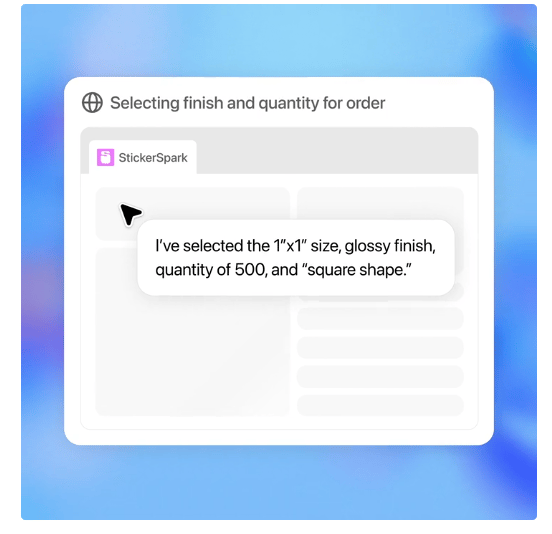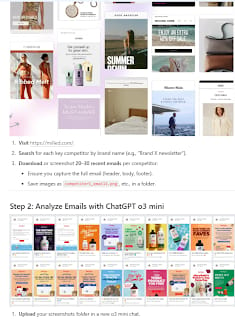- AI for Ecommerce and Amazon Sellers
- Posts
- The AI That Could Replace Half Your Daily Tasks Just Launched
The AI That Could Replace Half Your Daily Tasks Just Launched
Plus new from Meta & Apple

From Our Sponsor:
Find your customers on Roku this Black Friday
As with any digital ad campaign, the important thing is to reach streaming audiences who will convert. To that end, Roku’s self-service Ads Manager stands ready with powerful segmentation and targeting options. After all, you know your customers, and we know our streaming audience.
Worried it’s too late to spin up new Black Friday creative? With Roku Ads Manager, you can easily import and augment existing creative assets from your social channels. We also have AI-assisted upscaling, so every ad is primed for CTV.
Once you’ve done this, then you can easily set up A/B tests to flight different creative variants and Black Friday offers. If you’re a Shopify brand, you can even run shoppable ads directly on-screen so viewers can purchase with just a click of their Roku remote.
Bonus: we’re gifting you $5K in ad credits when you spend your first $5K on Roku Ads Manager. Just sign up and use code GET5K. Terms apply.
TL;DR: The AI That Could Replace Half Your Daily Tasks Just Launched
OpenAI just dropped ChatGPT Agent, and it's basically the "do everything" AI assistant we've been waiting for. Unlike previous chatbots that could only talk about tasks, this system actually executes them—combining web browsing, data analysis, and task completion into one unified platform. We're talking about an AI that can research competitor pricing across multiple marketplaces, generate formatted reports, update spreadsheets, and maintain context throughout the entire workflow. The performance benchmarks are genuinely impressive: 45.5% accuracy on spreadsheet tasks (compared to Excel Copilot's 20%) and nearly 90% accuracy on data analysis tasks.
OpenAI Just Dropped Their "Do Everything" Agent

Source: OpenAI
Okay, let's talk about how OpenAI just casually released what might be the most significant automation tool for e-commerce businesses since... well, maybe ChatGPT. ChatGPT Agent launched this week, and honestly, I'm genuinely impressed and slightly concerned about what this means for how we run our businesses.
Here's the deal: this isn't just another chatbot upgrade. OpenAI essentially took three of their separate tools—web browsing, data analysis, and conversation—and smooshed them into one super-powered system that can actually do things rather than just talk about them. It's like having an incredibly capable virtual assistant who never sleeps, doesn't need coffee breaks, and can switch between analyzing competitor pricing and booking your next trade show booth without missing a beat.
The "Holy Crap, It Actually Works" Moment
I'll be honest—I've been burned by AI overpromises before. Remember when everyone said chatbots would revolutionize customer service, then we all spent months explaining to customers that no, the bot couldn't actually help them with returns?
But this feels different. During OpenAI's demo, they showed the agent planning an entire wedding (including outfit shopping) and creating a custom 30-stop MLB stadium tour prioritized around Hello Kitty promotional nights. Which is oddly specific, but also exactly the kind of complex, multi-step research task that currently eats up hours of our time.
What caught my attention wasn't the flashy examples—it was the performance benchmarks. ChatGPT Agent hit 45.5% accuracy on spreadsheet tasks compared to Microsoft's Excel Copilot at 20%. That's not a small difference; that's "maybe I should rethink my entire workflow" territory.
For context, I spend embarrassing amounts of time wrestling with spreadsheets. Pulling pricing data from multiple marketplaces, updating inventory tracking sheets—all stuff that should be automated but never quite works right. The idea that an AI could handle this better than Microsoft's own tools is both exciting and slightly insulting to all the hours I've spent becoming an Excel power user.

Source: OpenAI
The Super-App Strategy (Or: How OpenAI Wants to Eat Everyone's Lunch)
Here's what's really happening: OpenAI is making a play to become the business equivalent of WeChat. Instead of juggling fifteen different tools for research, analysis, communication, and task management, you'd just... use ChatGPT Agent for everything.
This strategy makes sense when you consider that GenSpark (a competing AI automation platform) generated $36 million in revenue in just 45 days by automating real-world tasks. OpenAI looked at that success and essentially said, "Hold our coffee."
For those of us running e-commerce businesses, this consolidation trend is fascinating and terrifying in equal measure. On one hand, imagine having a single system that could:
Research competitor pricing across multiple platforms
Generate comparative analysis reports with proper formatting
Update your internal tracking spreadsheets
Draft supplier communications based on the findings
Schedule follow-up reminders
On the other hand, we're potentially looking at a future where OpenAI becomes the only business software vendor that matters. Which brings up some uncomfortable questions about vendor dependency that I'll get to in a minute.
What This Actually Means for Our Day-to-Day Operations
Let me get practical here. From the tests I've seen others doing with ChatGPT Agent on the kind of repetitive tasks that normally consume chunks of our week, the results have been... mixed, but promising enough to pay attention.
The system can maintain context while switching between different types of work, which is huge. You can start with competitive research, move into data analysis, then shift to creating action plans without losing the thread. For someone who regularly finds themselves with seventeen browser tabs open while trying to compile a simple market analysis report, this feels revolutionary.
But there are limitations worth acknowledging. The system requires 400 monthly queries for Pro users (only 40 for Plus subscribers), suggesting significant computational costs. Translation: this isn't going to be a casual-use tool. You'll need to be strategic about when and how you deploy it.
The Trust and Security Reality Check
Let's address the elephant in the room: giving an AI system this much access to your business operations requires a significant leap of faith. OpenAI has been refreshingly honest about the risks, including something called "prompt injection" where malicious websites could potentially manipulate the agent's behavior.
Imagine your AI assistant booking flights and encountering a compromised site that tricks it into extracting your credit card information. It's the kind of scenario that keeps security professionals awake at night and makes the rest of us wonder if we're moving too fast toward automation.
The company has implemented safeguards like requiring explicit confirmation for consequential actions and active supervision for sensitive tasks. But fundamentally, we're entering territory where the convenience of automation needs to be balanced against new categories of risk that most of us haven't had to think about before.
How We Should Actually Approach This
Based on what I'm seeing from early reports and the competitive dynamics around this launch, here's how I'm thinking about integrating tools like ChatGPT Agent into our businesses:
Start Small and Strategic: Don't immediately hand over your entire operation to an AI system. Pick specific, repetitive tasks that have clear success metrics and limited downside risk. Competitive research and data analysis are good starting points.
Develop AI Collaboration Skills: The businesses that succeed with these tools won't be the ones that use AI as a replacement for human judgment, but those that get really good at guiding AI systems toward useful outcomes. Time to start building that skill set now.
Verify Independently: As these systems become more capable, they also become better at confidently presenting incorrect information. Developing our own verification processes and maintaining healthy skepticism will be essential.
The Bottom Line for E-commerce Sellers
ChatGPT Agent represents a genuine step forward in business automation capabilities. The performance benchmarks suggest we've crossed practical thresholds where AI can handle significant portions of knowledge work rather than just providing conversational assistance.
For those of us selling online, this technology could address operational inefficiencies that have persisted despite previous automation attempts. The ability to research, analyze, and execute across multiple platforms while maintaining context could compress workflows that currently require constant human coordination.
But the competitive dynamics surrounding the launch provide important lessons. The most successful approach will likely involve embracing these capabilities while maintaining strategic independence and developing skills that complement rather than compete with expanding AI functionality.
Do You Love The AI For Ecommerce Sellers Newsletter?
You can help us!
Spread the word to your colleagues or friends who you think would benefit from our weekly insights 🙂 Simply forward this issue.
In addition, we are open to sponsorships. We have more than 35,000 subscribers with 75% of our readers based in the US. To get our rate card and more info, email us at [email protected]
The Content Spotlight:
A full email marketing workflow SOP with AI:
The Quick Read:
Instagram content is now searchable on Google. Reels, captions, even bios can show in search if they're keyword-rich and alt-texted. Social SEO is no longer optional. Treat every post like it’s built for discovery.
Meta has acquired Play AI, a startup known for natural-sounding voice generation. The full team joins Meta to power AI Characters, wearables, and audio tools as Meta doubles down on its AI ambitions.
Intangible, a new tool by Pixar and Unity vets, adds spatial intelligence to generative video. You control scenes in 3D before AI renders them.
Apple is eyeing a €5.8B deal for Mistral, Europe’s top AI startup. After Siri delays and talent loss to Meta, this move could reboot Apple’s AI momentum and close its gap in the generative race.
Facebook is demoting copycats and boosting original creators.
Breaking up Instagram from Facebook could backfire for users.
Lindy AI lets you build an inbox-to-action agent that reads emails, extracts key info, and sends Slack alerts or calendar invites.
Gmail’s new “Manage Subscriptions” tool shows all your email subs and lets you unsubscribe in a click. It’s user-friendly but tough love for marketers. Lazy emails won’t survive. Quality is now the cost of entry.
The Tools List:
💬 CopilotKit - Build in-app AI chatbots and AI-powered text areas
📹 Video interviews by Outset - Conduct user surveys with video and AI.
🖼️ Keep it shot - Instantly rename and find messy screenshots with AI
📹 Snoooz AI: Send personalized out of office responses and automatically loop in backups on urgent conversations, ensuring nothing slips through the cracks.
📚 Book Summarizer GPT - Summarizes books and provides key takeaways
🪡 Stitch Beta - Design at the speed of AI - Transform ideas into UI designs for mobile and web applications.
About The Writer:

Jo Lambadjieva is an entrepreneur and AI expert in the e-commerce industry. She is the founder and CEO of Amazing Wave, an agency specializing in AI-driven solutions for e-commerce businesses. With over 13 years of experience in digital marketing, agency work, and e-commerce, Joanna has established herself as a thought leader in integrating AI technologies for business growth.
For Team and Agency AI training book an intro call here.


